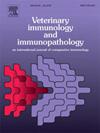利用新型重组单域结合试剂开发牛 IgG3 特异性检测方法
IF 1.4
3区 农林科学
Q4 IMMUNOLOGY
引用次数: 0
摘要
牛能表达三种亚类的 IgG 抗体--IgG1、IgG2 和 IgG3。与 IgG1 和 IgG2 不同,IgG3 的描述相对较晚,该亚类在免疫中的作用尚不清楚。我们使用重组牛 IgG1、IgG2 和 IgG3 单克隆抗体(mAbs)证明,在市售的抗牛 IgG mAbs 中,只有一种能识别 IgG3,而且没有一种 mAb 专门与 IgG3 结合。在这里,我们评估了一种名为 Ankyron™ AZS40101 的小型杏仁蛋白重复序列蛋白,它是为与牛 IgG3 结合而生成的。Ankyron™ AZS40101 与 IgG3 特异性结合,与 IgG1 和 IgG2 的反应性极小。Ankyron™ AZS40101 在 ELISA 检测中可用作捕获试剂或检测试剂。利用 Ankyron™ AZS40101 与 IgG1 和 IgG2 特异性 mAbs 一起检测接种异源口蹄疫病毒壳抗原的牛血清中的抗原特异性 IgG 亚类,结果显示除了 IgG1 和 IgG2 反应外,还有低水平的抗原特异性 IgG3 反应。对健康牛血浆样本中总 IgG1、IgG2 和 IgG3 水平的评估显示,IgG3 的平均浓度为 0.19 mg/mL,但明显低于 IgG1(平均 3.28 mg/mL)和 IgG2(平均 3.41 mg/mL)。因此,Ankyron™ AZS40101 是一种新型试剂,可用于测量牛 IgG3 对感染和疫苗接种的反应。本文章由计算机程序翻译,如有差异,请以英文原文为准。
Development of bovine IgG3-specific assays using a novel recombinant single-domain binding reagent
Cattle express three subclasses of IgG antibody - IgG1, IgG2 and IgG3. Unlike IgG1 and IgG2, IgG3 was described relatively recently and the role of this subclass in immunity is unknown. Using recombinant bovine IgG1, IgG2 and IgG3 monoclonal antibodies (mAbs), we demonstrated that only one of the commercially available anti-bovine IgG mAbs tested was able to recognize IgG3, and no mAb exclusively bound IgG3. Here, we evaluated a small ankyrin repeat protein, called Ankyron™ AZS40101, that was generated to bind to bovine IgG3. Ankyron™ AZS40101 bound specifically to IgG3 with minimal reactivity to IgG1 and IgG2. Ankyron™ AZS40101 was shown to be useful in ELISA assays as either a capture or detection reagent. Utilisation of Ankyron™ AZS40101 alongside IgG1 and IgG2 specific mAbs to detect antigen-specific IgG subclasses in the serum of cattle sequentially vaccinated with heterologous foot-and-mouth disease virus capsid antigens revealed a low-level antigen-specific IgG3 response, in addition to IgG1 and IgG2 responses. Assessment of the total IgG1, IgG2 and IgG3 levels in healthy cattle plasma samples showed that IgG3 was measurable at a mean concentration of 0.19 mg/mL, although this was significantly lower than those of IgG1 (mean 3.28 mg/mL) and IgG2 (mean 3.41 mg/mL). Thus, Ankyron™ AZS40101 is a new reagent that provides utility for measurement of bovine IgG3 responses to infection and vaccination.
求助全文
通过发布文献求助,成功后即可免费获取论文全文。
去求助
来源期刊
CiteScore
3.40
自引率
5.60%
发文量
79
审稿时长
70 days
期刊介绍:
The journal reports basic, comparative and clinical immunology as they pertain to the animal species designated here: livestock, poultry, and fish species that are major food animals and companion animals such as cats, dogs, horses and camels, and wildlife species that act as reservoirs for food, companion or human infectious diseases, or as models for human disease.
Rodent models of infectious diseases that are of importance in the animal species indicated above,when the disease requires a level of containment that is not readily available for larger animal experimentation (ABSL3), will be considered. Papers on rabbits, lizards, guinea pigs, badgers, armadillos, elephants, antelope, and buffalo will be reviewed if the research advances our fundamental understanding of immunology, or if they act as a reservoir of infectious disease for the primary animal species designated above, or for humans. Manuscripts employing other species will be reviewed if justified as fitting into the categories above.
The following topics are appropriate: biology of cells and mechanisms of the immune system, immunochemistry, immunodeficiencies, immunodiagnosis, immunogenetics, immunopathology, immunology of infectious disease and tumors, immunoprophylaxis including vaccine development and delivery, immunological aspects of pregnancy including passive immunity, autoimmuity, neuroimmunology, and transplanatation immunology. Manuscripts that describe new genes and development of tools such as monoclonal antibodies are also of interest when part of a larger biological study. Studies employing extracts or constituents (plant extracts, feed additives or microbiome) must be sufficiently defined to be reproduced in other laboratories and also provide evidence for possible mechanisms and not simply show an effect on the immune system.

 求助内容:
求助内容: 应助结果提醒方式:
应助结果提醒方式:


